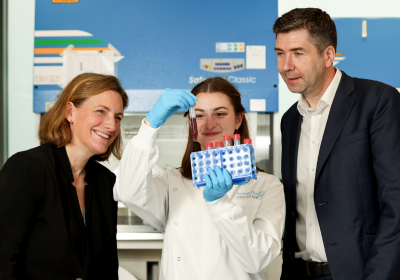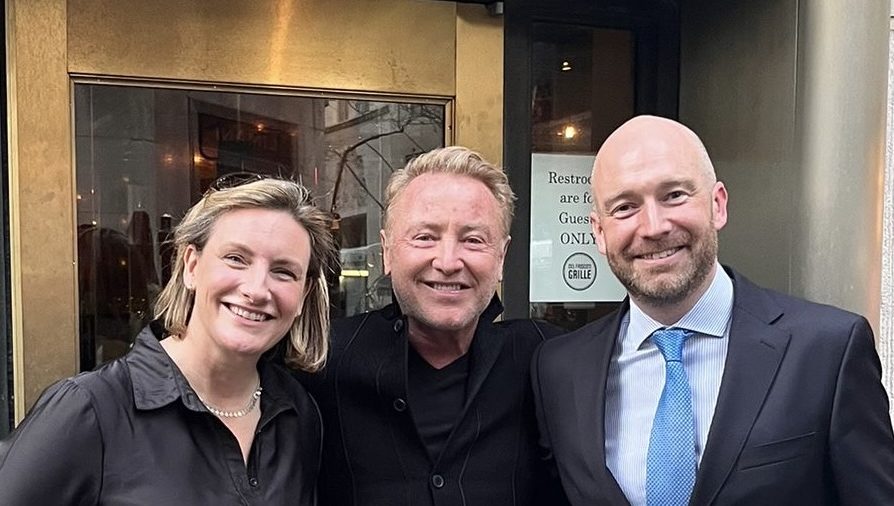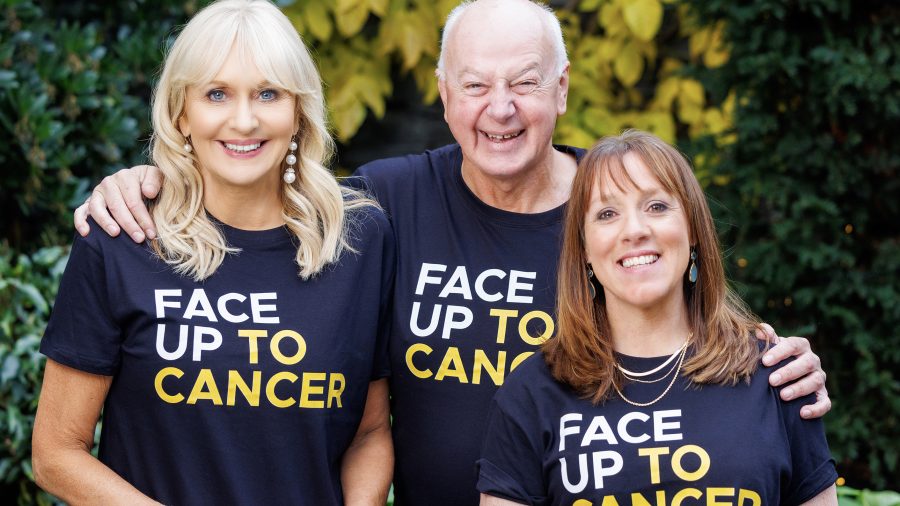 On World Cancer Day, Breakthrough warns that cancer treatment risks falling behind as the COVID-19 pandemic continues
On World Cancer Day, Breakthrough warns that cancer treatment risks falling behind as the COVID-19 pandemic continues
“More research funding for new treatments is urgently needed as cancer continues to take one life every hour of every day”, Orla Dolan CEO Breakthrough Cancer Research
“If I had seen my doctors in person at my regular check-ups, I think they would have found my new tumour faster,” patient with breast cancer Sandie O’Neill whose treatment and diagnosis was impacted by Covid.
“Everyone is getting a glimpse of what it’s like to wait for a research breakthrough”, patient with ovarian cancer Lucy Fahy
Today on World Cancer Day, Breakthrough Cancer Research is calling for an urgent approach to finding new treatments for cancer, similar to the rapid response taken globally to combating COVID-19. The charity says there is an urgent need for more research funding in Ireland, as the pandemic has effectively caused a ‘ticking timebomb’ for the disease.
Cancer already takes one life every hour of every day in Ireland, a statistic that Breakthrough says will undoubtedly increase, as recurring lockdowns mean delays in cancer screenings, referrals and some treatments.1 In addition to this, the pandemic’s impact on research has been significant with lab closures, disruptions to clinical trials and difficulty accessing patient samples to test, all of which make treatment more difficult while increasing the cancer challenge.
However, on World Cancer Day, Breakthrough also wants to highlight and celebrate the incredible advancements that have been made in cancer treatment through research. The charity currently supports the work of 67 researchers throughout the country and has already brought 8 cancer treatments successfully to clinical trial. Breakthrough also has ground-breaking new cancer treatments in the pipeline. These treatments could be advanced further in clinical trials and made available to patients faster if more funding was available.
CEO of Breakthrough Cancer Research, Orla Dolan, said, “We all now know what it’s like to anxiously wait for a life-saving research breakthrough, to have hope for a future free from illness. However, while research is beginning to deliver for Covid, patients with cancer continue in a state of anxiety as they wait for a new treatment. Not only that, but their risks have increased and their only hope – cancer research – risks falling behind. Cancer won’t wait and covid is like a ticking timebomb for the disease.”
Professor Risteárd Ó Laoide, head of the National Cancer Control Programme, said that already in November that up to 2,000 cancers may have been “lost” as a result of the disruption caused by the COVID-19 pandemic.2
Commenting on the impact that COVID has had on her treatment and diagnosis, breast cancer patient Sandie O Neill from Kildare said, “Check-ups for people living with long term cancer are so important. Over the past year, I have had no blood tests, whereas pre-Covid I used to have them every 3 months. My doctors were very nice during my phone consultations, but they could not examine me, and they had no blood results. If I had seen them in person at my regular check-ups, I think that they would have found the new tumour faster. Everyone has only one life, and I had to keep asking until I eventually got a bone scan done. Everyone needs to be aware of their own body and fight for treatments. Thankfully, I am on new treatment now, which I started last week.
“Research is working. The new treatment I am on is very different from the treatments I had when I was first diagnosed 13 years ago. And I have been advised that if this one does not work, there will be something else I can try. It’s very reassuring to know there are treatments there for me, and that is because of research.”
Commenting on living with cancer during the pandemic, ovarian cancer patient, Lucy Fahy, from West Cork said, “Everyone is now in crisis, no matter their situation, so it almost feels like people are playing catch up to where patients with cancer were already. Living under threat, practicing hygiene, fearing infection, having all certainty of the future ripped away are all normal for anyone who has gone through something like cancer so now everyone’s getting a glimpse of how that is too. I suppose the main thing Covid has done for those in cancer treatment is to add extra layers of uncertainty and to make an already difficult thing that bit more difficult.
“Covid has made my world much smaller, which has intensified my cancer experience. It feels like all at once, every single coping mechanism carefully developed over time was suddenly removed and what was left was the illness, then this whole new threat on top. Now there is nowhere to run to, no normality to escape into.
Lucy is currently working with Breakthrough Cancer Research on a new national campaign to drive awareness of the urgent need for research funding. Breakthrough says the same funding approach should be taken for tackling cancer to the rapid response taken globally to combating COVID-19.
Orla Dolan continued: “Everyone now knows the power of research. It is the only thing that will create new and more effective treatments for diseases, and give back birthdays, weddings and futures. While the end is hopefully in sight for the coronavirus, there is still a long way to go for the original big C – cancer.
“Cancer research has already created so many survivors, and more lives can be saved now, but we need the same sense of urgency to funding cancer research as there is with Covid. We need to find ways to shorten the time it takes to get new effective treatments to patients who are waiting for them, and we urgently need to make up the time we have lost, and with public support – and hopefully government support in the future – even increase the pace. Every euro donated saves lives.”
The current COVID-19 surge is making cancer consultants throughout the country very anxious. Professor Roisin Connolly, Gerald O’Sullivan Chair in Cancer Research, University College Cork and Cork University Hospital, said, “We need to keep research and clinical trials going as new and better cancer treatments have never been more important. Patients with cancer are living in very trying times. In addition to being particularly vulnerable to Covid19 and experiencing months of isolation, cancer treatments including clinical trial options may be disrupted in the current environment, screening programmes may be delayed, and many people are avoiding investigating new symptoms during lockdown phases. Unfortunately, this means that cancer may be discovered in patients much later, when they may be harder to treat. Clinical trials for new drugs and treatments may be an important path forward for many patients and we need to continue to support these efforts”.
Commenting on the disruption to cancer research, University College Dublin researcher Professor Breandan Kennedy said, “Thankfully, our research into novel treatments for uveal melanoma in 2020 continued during the pandemic, but it has been significantly hampered. For instance, access of the cancer researchers to the labs was severely reduced for several months. Undoubtedly, the most substantial impact has been on access to patient samples for research; because due to COVID-19 restrictions the scheduled surgeries were cancelled or the pathology lab was unable to provide tumour tissue for research. These are unique, precious samples that allow us investigate the response of each patient’s primary uveal melanoma to research drugs.
Summing up what’s so important about cancer research, Orla Dolan highlighted that: “50 years ago, breast and prostate cancer survival rates were less than 50%. Thanks to research, they’re now over 85% which is incredible and today we want to celebrate the amazing researchers and patients giving time to research to save others.
“However, despite this progress, today survival rates for some cancers are still less than 10%. That’s not a number we’re prepared to accept. With better diagnostics and treatments for all, we won’t have to. Help us achieve 100% survival for 100% of cancers.”
Breakthrough Cancer Research is Ireland’s leading cancer research charity. They work with researchers and scientists on exciting developments in cell-therapy, immuno-therapy, surgery alternatives and personalised medicine which will improve survival rates and minimise side effects of current treatments. It has partnerships in place with experts from a number of worldwide centres of research excellence including Cancer Research at UCC, the Conway Institute UCD, Trinity Translational Medicine Institute, Royal College of Surgeons Ireland, Weill Cornell Medical College (New York), Royal Marsden (UK), the Wilmot Cancer Institute (Rochester, NY), University of Copenhagen and Centre for Surgical Science (DK). The aim is to substantially increase this collaboration if funding and resources were available. However, Breakthrough is currently entirely reliant on donations from the public.
This year’s World Cancer Day theme is ‘I Am and I Will’, focusing on the power that each person has to reduce the global impact of cancer. Breakthrough is calling on everyone to play their part in a future free from cancer by supporting cancer research today. Help buy back futures on breakthroughcancerresearch.ie or call 021 4226655. #MakeMoreSurvivors #IAmAndIWill
Notes/References:
- Statistics:
During March and April 2020 (n=2658) there was a 41% reduction in electronic referrals for cancer services compared to January 2020 (n=4499). There was also a 71% reduction in general eReferrals for Radiology during this period (1,485 (April 2020) v 5077 (Jan 2020)). The numbers of eReferrals to both cancer services and radiology recovered in June with the easing of lockdown. In fact according to the NCCP1 the 2020 numbers of Symptomatic breast and pigmented skin lesion eReferrals exceeded those of 2019, as did the number of eReferrals for radiology.
However, eReferrals to the Rapid Access Lung clinics were down 10% (1572 v 1723) and down 3% (3390 v 3475) to the Rapid Access Prostate clinics in 2020 compared to 2019. The number of e Referrals to Rapid Access lung clinics remained 44% lower in December 2020 compared to January 2020 (137 v 207). So while cancer services are recovering and cancer is a priority within the health system, the impact of these delays in referrals on patient outcomes will not be known for a number of years.
Research has been severely impacted with most university laboratories closed during the first lockdown, and many again have their doors closed due to Covid-19.
https://www.ehealthireland.ie/A2I-HIDs-Programme/eReferral/Latest%20Data/NCCP%20Referral%20Data/
- Prof Risteárd Ó Laoide quote
https://www.irishtimes.com/news/health/up-to-2-000-cancers-may-be-lost-because-of-covid-disruption-1.4420581
For press contact
Maria Rolston or Niamh Murphy, ETC
[email protected] [email protected] / 0870617705
Donate Now












 Contact
Contact